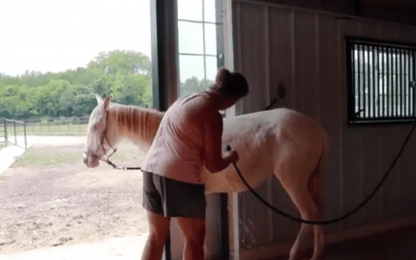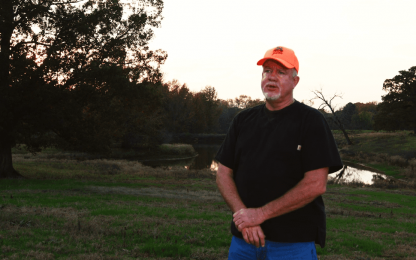Young farmers are finding their fit working both on and off the family farm.
Heather Hardy has been jumping in equipment cabs since she was a little girl. And today, she loves her job as a female precision ag specialist.
She recalled a funny story when an older gentleman needed his planted hooked up. “He said ‘I’ll let you drive, but I’ve got to ride with you to make sure you know how to run this,'” Heather said. “I wanted to say, ‘Oh, gracious, don’t worry about me. That won’t be a problem!’”
She and her three siblings are the sixth generation to work on their family’s farm in Gates, Tennessee. Much of the land they farm is part of an original government land grant from when Tennessee was first established as a territory.
Heather, her father, brother and husband continue to run the family farm. Heather says she works hard to find the balance between being an employee and a producer.
Setting out on her own
“My parents have always wanted us to come back to the farm,” says Heather. “But they didn’t want us to come back if we felt we had to.”
Her parents were adamant that their children work off the farm before coming back. Working for someone who didn’t know them would force them to build their own reputations.
They had additional advice for her as well. “They kept saying, ‘If all you want to do is farm, we can teach you how to farm. Go get an education that brings value back to the operation.”
In high school, Heather observed researchers from Mississippi State University and the University of Tennessee collecting data for an efficiency study on onboard module-building cotton pickers at her family’s farm. She got to know the professors fairly well and realized she wanted to do something focused on engineering. “I’m a problem-solver. I like a good puzzle,” she says. “I knew I wanted to go into precision agriculture because it wasn’t expertise we had on the farm.”
She attended Mississippi State, where she studied biological engineering in the university’s Bagley College of Engineering. During college, she spent six months traveling throughout the southeastern United States as an intern with a field service team that worked on everything from forage harvesters to square balers. After that experience, she knew she was in the right spot.
After graduation, Heather almost accepted a position in Illinois. The company had a hiring freeze at the last minute and that ended up being okay, she says. “The job was kind of a dream job and it was very exciting. But there was also that lingering tug of not being at home.”
Coming back home
Heather spent her summers during college working on the farm. As she grew up, her family didn’t hesitate to throw her new responsibilities. “The summer of 2013 was one of the first years we grew and harvested wheat on the operation in a long time,” says Heather. “And my dad told me, ‘You’re going to run the wheat harvest.’”
Faced with a new machine, Heather did what her engineering background told her to do: She read the owner’s manual. “I think I’m one of the only people who’s ever read the owner’s manual for a combine.”
But being on a family operation meant help was never far away. Despite reading the manual, when it came to her first time running the combine, the wheat wasn’t feeding into the header. Her grandfather was able to get in the cab and figure out what was going on. “With farming, I think that gut feeling and being able to figure things out just comes with years of experience,” says Heather. “Luckily, we have a lot of that on our operation.”
As fate would have it, after the Illinois position fell through, a precision ag coordinator position with a local equipment dealer opened up in a town near the family’s operation. Heather took that job and returned to the farm – and went right to work.
Of course, working full time and contributing to the family operation isn’t always easy. “I’ve worked with growers until 8:00 p.m. and I’ve answered customer phone calls on Sundays when we’re riding around looking at fields for the farm,” Heather says. “Most growers around here understand that I’ll answer the phone. But I may be in the seat of a tractor on Saturdays helping my family’s operation.”
“Commercial operations are run by families.”
It’s not surprising that Heather is passionate about the connection between family and agriculture. “We’ve done a great job showing that ag is commercialized, but to the point where the general population doesn’t realize that commercial operations are run by families.”
“Farmers aren’t big, bad and scary,” she says. “We care as much about our product as the people eating it.”
In her current position on the family farm, Heather works very closely with her dad and brother to manage the farm’s finances and day-to-day operations. Her parents have always been open with every aspect of farming, including the operation’s books, she adds. She and her husband recently attended the Farm Credit Mid-America Growing Forward conference, which deepened her business knowledge.
When asked for advice to aspiring farmers on how to balance full-time employment and being a producer, Heather has this to say: “You just have to find your fit, make it work and keep going, no matter what.”



